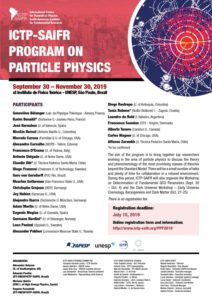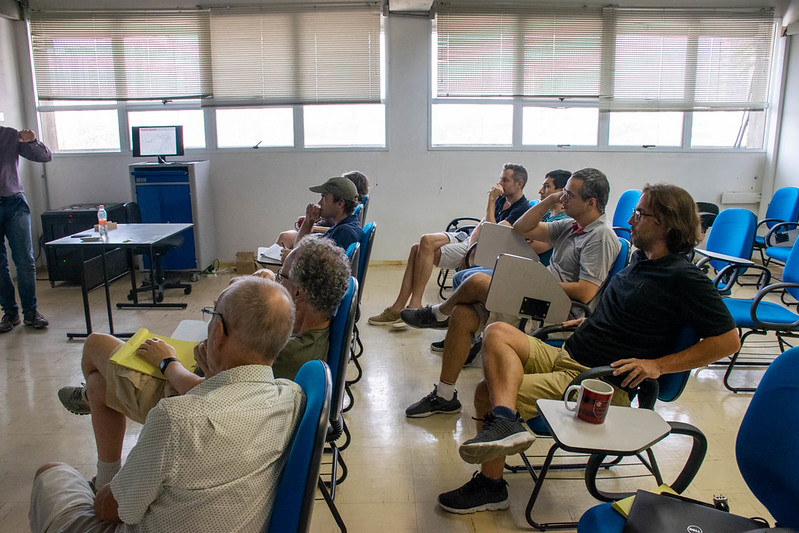ICTP-SAIFR Program on Particle Physics
September 30 – November 30, 2019
ICTP-SAIFR, São Paulo, Brazil
Auditorium of IFT-UNESP

Home
The aim of the program is to bring together top researchers working in the area of particle physics to discuss the theory and phenomenology of the most promising classes of theories beyond the Standard Model. There will be a small number of talks and plenty of time for collaboration in a relaxed environment.
Several related workshops will be organized during this period. For additional information, please check the following websites:
- Workshop on Determination of Fundamental QCD Parameters (September 30 – October 4, 2019)
- Workshop on Skills for Young Scientists/Increasing Diversity in STEM (October 7-11, 2019)
- Minicourse on Dark Matter Physics with MicrOMEGAs (October 15-17, 2019)
- Workshop on Quantum Symmetries (October 16-18, 2019)
- Dark Universe Workshop – Early Universe Cosmology, Baryogenesis and Dark Matter (October 21-25, 2019)
- Eduardo Pontón Memorial Symposium (October 28, 2019)
There is no registration fee. If you have any questions, please send an E-mail to secretary@ictp-saifr.org
Announcement
Online registration is now closed
List of participants:
- Geneviève Bélanger (Laboratoire de Physique Théorique – Annecy, France)
- Karim Benakli (Sorbonne University-Jussieu-Paris, France): Hunting spin 3/2 fields through gravitational waves
- Marcela Carena (Fermilab & University of Chicago, USA)
- Alexandra Carvalho (NICPB-Tallinn, Estonia): HH searches at CMS
- Francesco D’Eramo (University of Padova, Italy): X-ray lines from dark matter with unique spectrum and morphology
- Antonio Delgado (University of Notre Dame, USA)
- Claudio Dib (Universidad Técnica Federico Santa Maria, Chile): Low Scale seesaw from Neutrino Condensation
- Thomas Flacker (Institute for Basic Science, Center for Theoretical Physics of the Universe, South Korea): Common exotic decays of vector-like top partners: Motivation, challenges, and opportunities for collider searches
- Diogo Franzosi (Chalmers University of Technology, Sweden): Phenomenological considerations about top-quark partial compositeness
- Gero von Gersdorff (PUC-Rio, Brazil): Flavor from Random Clockwork Models
- Maarten Golterman (San Francisco State University, USA): Dilaton chiral perturbation theory and near-conformal gauge theories
- Jay Hubisz (Syracuse University, USA): Self-Organization, Open Systems, and the Hierarchy Problem
- Alejandro Ibarra (Technische Universität München, Germany)
- Adam Martin (University of Notre Dame, USA)
- Eugenio Megías (University of Granada, Spain): Holographic Phase Transition in Soft Walls: Gravitational Waves and Collider Signatures
- Germano Nardini (University of Stavanger, Norway): From the stochastic gravitational signal to fundamental physics with LISA
- Matthias Neubert (MITP/Johannes Gutenberg University, Germany)
- Alexander Pukhov (Lomonosov Moscow State University, Russia): Dark Matter Physics with micrOMEGAs
- Diego Restrepo (University of Antioquia, Colombia): Minimal radiative Dirac neutrino mass models
- Tania Robens (Ruđer Bošković Institute – Zagreb, Croatia): Constraining extended scalar sectors at the LHC and beyond
- Alberto Tonero (Carleton University, Canada): Mirror Dirac Leptogenesis
- Carlos Wagner (University of Chicago, USA)
- Alfonso Zerwekh (Universidad Técnica Federico Santa Maria, Chile): Towards a Partial Unification of the Electroweak and Dark Sectors
Organizers:
-
Alexander Belyaev (University of Southampton, UK)
-
Mariano Quirós (IFAE Institute of High Energy Physics, Spain)
-
Rogério Rosenfeld (IFT-UNESP/ICTP-SAIFR, Brazil)
Satisfaction survey: click here
Tentative dates:
Registration
Program
Videos&Files
#October 14, 2019
- Alexandra Carvalho (NICPB-Tallinn, Estonia): Studies on the Higgs potential at the LHC
#October 15, 2019
- Claudio Dib (U. Técnica Federico Santa Maria, Chile): Low Scale seesaw from Neutrino Condensation
#October 16, 2019
- Dmitry Vasilevich (Universidade Federal do ABC, Brazil): Index Theorems, Anomalies, and all that (IFT-Colloquium)
#October 29, 2019
- Gero von Gersdorff (PUC-Rio, Brazil): Flavor from Random Clockwork Models
#October 30, 2019
- Francesco D’Eramo (University of Padova, Italy): X-ray lines from dark matter with unique spectrum and morphology
#October 31, 2019
- Jay Hubisz (Syracuse University, USA): Self-Organization, Open Systems, and the Hierarchy Problem
#November 1, 2019
- Tania Robens (Ruđer Bošković Institute – Zagreb, Croatia): Constraining extended scalar sectors at the LHC and beyond
#November 07, 2019
- Diogo Franzosi (Chalmers University of Technology, Sweden): Phenomenological considerations about top-quark partial compositeness
#November 27, 2019
- Alberto Tonero (Carleton University, Canada): Mirror Dirac Leptogenesis
#November 29, 2019
- Germano Nardini (University of Stavanger, Norway): From the stochastic gravitational signal to fundamental physics with LISA
Photos
Additional Information
List of Participants: Updated on September 24, 2019
Visa information: Nationals from several countries in Latin America and Europe, Australia, Canada, Japan and USA are exempt from tourist visa. Please check here which nationals need a tourist visa to enter Brazil. Please check here which nationals need a tourist visa to enter Brazil.
Accommodation: Participants, whose accommodation will be provided by the institute, will stay at The Universe Flat. Hotel recommendations are available here
How to reach the Institute: The workshop will be held at ICTP South American Institute, located at IFT-UNESP, which is across the street from a major bus and subway terminal (Terminal Barra Funda). The address which is closer to the entrance of the IFT-UNESP building is R. Jornalista Aloysio Biondi, 120 – Barra Funda, São Paulo. The easiest way to reach us is by subway or bus, please find instructions here.
Yellow fever vaccination is recommended for travellers going to Brazil. Note that the vaccine needs to be taken at least ten days before the trip to be effective. Information: https://wwwnc.

